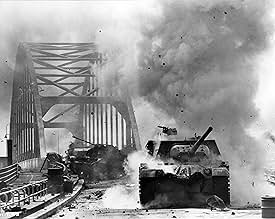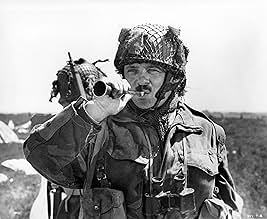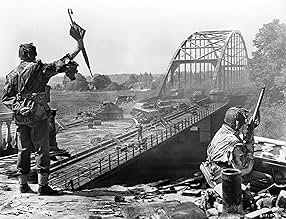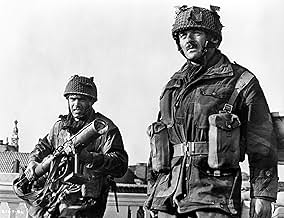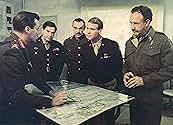Operazione Market Garden, settembre 1944: gli Alleati tentano di catturare diversi ponti strategicamente importanti nei Paesi Bassi nella speranza di rompere le linee tedesche.Operazione Market Garden, settembre 1944: gli Alleati tentano di catturare diversi ponti strategicamente importanti nei Paesi Bassi nella speranza di rompere le linee tedesche.Operazione Market Garden, settembre 1944: gli Alleati tentano di catturare diversi ponti strategicamente importanti nei Paesi Bassi nella speranza di rompere le linee tedesche.
- Regia
- Sceneggiatura
- Star
- Ha vinto 4 BAFTA Award
- 7 vittorie e 5 candidature totali
- Underground Leader's Wife
- (as Marlies Van Alcmaer)
- Underground Leader's Son
- (as Eric Van't Wout)
- Gen. Blumentritt
- (as Hans Von Borsody)
Recensioni in evidenza
In 1944, the German armies were being pushed back across the Low Countries. The Allies' great strategic problem was the Rhine, the wide river which formed Germany's western border. A daring plan was conceived which would overcome the Rhine obstacle and open the road to Berlin. 'Market Garden', as the plan was codenamed, involved parachuting spearhead units onto the great bridges over the Rhine and securing them for the critical few hours it would take for an armoured column to drive up and relieve them.
It is easy now to point to the flaws in 'Market Garden', but at the time it looked like a daring and viable alternative to slogging it out against the Siegfried Line. No-one had anticipated that the Dutch people would pour out onto the streets in throngs, thinking that they had been liberated, and thus bog down the armour. The intelligence indications of heavily-equipped German units in the zone were ignored because they were inconvenient. Critically, the plan allowed for only one solitary road to be available to the Irish Guards for the all-important northward thrust. The film illustrates very effectively the way in which a plan can develop its own momentum, regardless of the shortcomings which riddle it.
The sequence of the boarding and dropping of the paratroops is a thrilling spectacle, shot on a colossal scale. The German ambush which delays the rolling of the armoured column is another terrific action sequence. Attenborough keeps tight control of a big, complex story, and interlards the large-scale stuff with 'human scale' passages, like James Caan's rescue of his buddy (incidentally, the tracking shot which follows his jeep through the forest is quite remarkable).
The fighting at Nijmegen is brilliantly-filmed. Note how the street on the British side grows increasingly littered with war debris as the battle rages. Robert Redford's assault across the river is a symphony in olive drab, leading to a wonderful moment of exhilaration.
Whether the viewer finds the singing of "Abide With Me" moving or grossly sentimental will depend on personal taste, but the subdued ending is very satisfying. 'Market Garden' may have helped shorten the war and may have achieved most of its immediate objectives, but it has to be seen as a tragic mistake.
The film is slick, professional and very pleasing on the eye. One can't help wondering, however, if this kind of 'tank opera' was worth the effort, given that "The Longest Day" had done it all so splendidly a generation earlier.
The film is based upon Operation Market Garden, an Allied plot hatched towards the end of 1944 with the intention of ending the war in Europe. The concept behind the plan was to drop 35,000 soldiers into Holland approximately 60 miles beyond the German lines, to seize six vital bridges, and to reinforce the paratroopers by sending in thousands of ground troops. However, various mishaps jeopardised the mission and eventually the Allies were cut off and had to withdraw, suffering severe losses.
As stellar casts go, A Bridge Too Far still takes some rivalling. Among the many famous actors involved, these are just a few: Sean Connery, Robert Redford, Laurence Olivier, Dirk Bogarde, James Caan, Ryan O'Neal, Gene Hackman, Michael Caine, Anthony Hopkins and Elliott Gould. It seems pointless for some of the actors to be cast in these roles - true enough, Connery, Bogarde and Hopkins get decent roles and a fair bit of screen time, but was it really worth paying Redford $2,000,000 for his ten minute heroics? Could a decent actor have not handled the role for a fraction of that amount? Is Gene Hackman really the correct choice for Polish officer Major General Stanislaw Sosabowski? Should a light comic actor like Elliott Gould be doing his cigar-chomping "fun" turn in a movie as serious as this?
Luckily, the film is a big success on other levels. The cinematography is extraordinary; the music is suitably stirring; the potentially confusing story is handled with clarity and true-to-the-facts sensitivity; and amid the chaos a number of very memorable scenes emerge. A Bridge Too Far is a very good war film - maybe the biggest war film ever conceived (The Longest Day and Saving Private Ryan included) - and I feel that, although it has a few casting flaws, it is in almost every other department a great, great achievement.
The final scene with Liv Ulman and Lawrence Olivier evacuating their estate turned into a graveyard is practically worth the price of admission by itself.
This is a sweeping, big budget epic movie with a star-studded cast. Definitely unfocused, but Attenborough pulls it off with considerable historical accuracy and his signature deft touch retelling of this sprawling military debacle. He makes excellent use of his tremendous cast, instead of just having them making appearances. He has plenty of subtle touches like that final scene.
The reception of the movie was hurt I think by its proximity to the Vietnam war. But it has aged very well.
The movie is flawless. As mentioned above, it is surprisingly accurate. As one would expect from the cast, acting is first rate. Not a single scene is wasted.
This is a "must see" movie for anyone who appreciates movie making.
Lo sapevi?
- QuizSir Dirk Bogarde's portrayal of General Browning was highly controversial, and several friends of the late General suggested that, had Browning still been alive in 1977, he would have sued director Sir Richard Attenborough and screenwriter William Goldman for libel. Bogarde took issue with the portrayal during filming, having known Browning personally, as he was a member of Field Marshal Bernard L. Montgomery's staff during the war. Bogarde was upset by the personal criticism he received following the release of the film, especially as he had not been involved in the writing of the script. Although Attenborough publicly took responsibility for the controversy, his relationship with Bogarde was never the same again. Browning's son said he believed his father was made the fall guy for the failure of Operation Market Garden in the film because the producers knew there would have been too much flak if they went after Montgomery.
- BlooperThe Allied plans for Market-Garden were correctly shown as falling into German hands from a downed Allied plane. In the film, they were ignored. In actuality, they were turned over to German paratroop expert General Student, who realized their accuracy and importance and used them in determining his troop deployments.
- Citazioni
[an SS officer is approaching under a white flag]
Major Harry Carlyle: Rather interesting development, sir.
[to the German]
Major Harry Carlyle: That's far enough! We can hear you from there!
SS Panzer Officer: My general says there is no point in continuing this fighting! He wishes to discuss terms of a surrender!
Major Harry Carlyle: Shall I answer him, sir?
Lt. Col. John Frost: Tell him to go to hell.
Major Harry Carlyle: We haven't the proper facilities to take you all prisoner! Sorry!
SS Panzer Officer: [confused] What?
Major Harry Carlyle: We'd like to, but we can't accept your surrender! Was there anything else?
[German officer walks off]
Lt. Col. John Frost: Well, that's that.
[the officer returns to General Bittrich, and they converse in German]
SS Panzer Officer: They rejected our surrender offer. What are your orders, Herr General?
Lt. General Bittrich: Flatten Arnhem.
- Versioni alternativeThe UK cinema release was cut by the BBFC in order to get an "A" rating by editing out the word "fucking" in the scene where James Caan holds the doctor at gunpoint, while Elliott Gould's line "Roll the fuckers" was dubbed over with "Roll it, fellas." In addition, a shot of a dead soldier with his intestines exposed was cut, and closeups of men's bloody faces during the assault on Arnhem were also removed. The cuts were restored in the 15-rated video and DVD versions.
- ConnessioniEdited into Il mio nome è Modesty (2004)
- Colonne sonore3rd Movement
(from Brandenburg Concerto No. 6 in B-Flat Major, BWV. 1051) (uncredited)
Music by Johann Sebastian Bach
I più visti
Dettagli
- Data di uscita
- Paesi di origine
- Lingue
- Celebre anche come
- Un puente demasiado lejos
- Luoghi delle riprese
- Nijmegen, Paesi Bassi(Nijmegen Bridge scenes and battle sequence)
- Azienda produttrice
- Vedi altri crediti dell’azienda su IMDbPro
Botteghino
- Budget
- 27.000.000 USD (previsto)
- Lordo Stati Uniti e Canada
- 50.750.000 USD
- Lordo in tutto il mondo
- 50.750.000 USD
- Tempo di esecuzione
- 2h 55min(175 min)
- Colore
- Proporzioni
- 2.35 : 1



